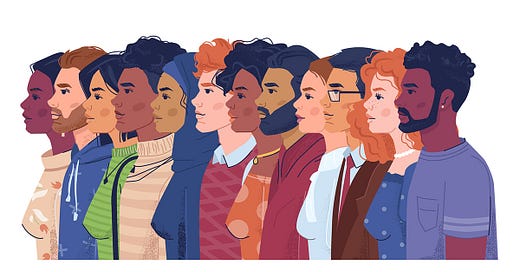There has been a backlash as of late against colleges that use race and ethnicity as factors to determine who gets in. The objective, ostensibly, is to promote “diversity.” But this has turned some ethnic groups into big losers in the college admissions game - particularly Asians, who tend to score really well on standardized admissions tests. But now, they're fighting back. Today your favorite blogger will deep dive into this “diversity” thing and analyze the rationale behind it, and why it is flawed from the get-go.
To begin, let us point out that colleges and universities are basically private institutions. That means that, in a truly free market, they can set their own standards for admissions, hiring, and everything. So if a college wishes to, for example, only admit six-foot tall blonde-haired, blue-eyed Christian heterosexual males, well, that’s their business – not your business, not mine, not the government’s.
However, there’s a sidebar here that complicates matters: colleges get taxpayer money. The amount varies, but a 2011 article in MPR News states that, for public institutions in the U.S., it’s between $8 thousand to $100 thousand per degree awarded, with an average of about $60 thousand… And that doesn’t count Biden’s plan to forgive student loans. Surprise surprise - that money comes with strings attached! Thus the governmental powers-that-be do indeed have some say-so, such as who gets in and who doesn’t.
So with that being said, let us go one level beyond the pure political ramifications thereof, and address this issue from the viewpoint of the college administrator, who’s goal is to maximize the entire college experience, add value to the degree earned, and attract students and donors.
The rationale behind the whole “diversity” argument is that being exposed to a variety of ethnicities and cultures makes one a more well-rounded individual. This person will be knowledgeable of the world and all the inhabitants thereof, tolerant and accepting of those who may be “different.” And be an effective leader!
Ok, I will not argue with the above statement. Yes, when one sets out to make their mark in the world, it is indeed beneficial to have interacted with others with different backgrounds, cultures, languages, viewpoints, and skin color. Living in a cocoon surrounded only by demographically identical people fosters narrow-minded ignorance. And so, the thinking goes, let’s integrate diversity as an integral component of a college degree! Great idea - in theory. But a terrible idea in actual practice. Here’s why:
First, realize the hard reality of supply and demand: there are only a limited number of college openings for students, yet a much larger pool of applicants. How to choose?
The best admission factors should be intelligence and potential. I know - this infuriates the woke crowd who take the “all men are created equal” concept to extremes. But the cold hard fact is that life is a meritocracy. Smarter, more ambitious people tend to succeed more so than the not-so-smart, not-so ambitious. A college degree should signify that, at the minimum, you were smart enough to get in and do the work.
Thus the only way to achieve ethnic diversity goals is to abandon intelligence as an admission factor and replace it with nonsense like skin color. Dumb down the standards - at least for some ethnic groups. How blatantly racist can you get, admitting up front that people of a certain race lack the brains to pass the test? And then that degree they awarded you no longer implies a minimum intelligence level.
Let me remind my readers that anybody, regardless of race, can sit for the admissions tests and apply for any college. Even a Black kid from the poorest ghetto slum imaginable can study hard, excel at school, and get into an elite university. Scholarships are available to help with finances. If the kid doesn’t take advantage of these abundant opportunities, and the racial balance ends up skewed, don’t blame the admissions department.
High admissions standards have many positive aspects. When one is surrounded by intelligent people, it tends to “rub off” on you. As a musician, I personally find that performing with other superb musicians makes me better. Anyone who plays sports will tell you that playing with better athletes makes them better. It’s the same with school.
Furthermore, if a goal of college is to produce future leaders, then let’s admit that a leader must be smart. Dumbing down admissions standards, ostensibly to promote diversity, means that the college grad might not truly have what it takes to be a good leader.
Ok, so given that having real-life exposure to diverse cultures is advantageous, how then should one acquire this, if not at college? The answer is: You go to them, not try to get them to come to you. It’s called travel. Get out there and see the world, first-hand! A trend that is gaining popularity is for high school grads, upon graduating, taking time off to do just that. What phase in life is better for this type of adventure! A typical 18-year old has no debt, does not own a lot of stuff (car, house, etc.), is healthy, and curious about the world.
As a sailor, I can personally testify that one great and inexpensive way to experience the world is to learn the basics of boatmanship and become a crewman. Check out websites like Find a Crew. Skippers all over the world need helpers who can volunteer their time.
Then, after seeing the world, it’s time to knuckle down, study, and start building a career. College administrators can look favorably on an applicant with things like that on their resume. Then we can end racial discrimination for good.










The reality of meritocracy cannot be denied. Nice article and thanks.
“But the cold hard fact is that life is a meritocracy….” Amen.